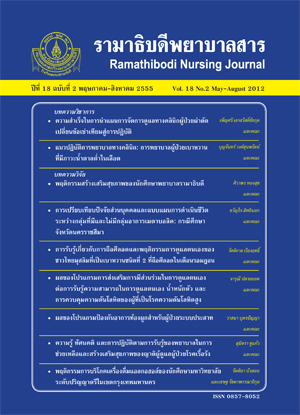ผลของโปรแกรมการส่งเสริมการมีส่วนร่วมในการดูแลตนเองต่อการรับรู้ ความสามารถในการดูแลตนเองน้ำหนักตัว และการควบคุมความดันโลหิตของผู้ที่เป็นโรคความดันโลหิตสูง
Main Article Content
Abstract
บทคัดย่อ
การวิจัยครั้งนี้ เป็นการวิจัยกึ่งทดลองแบบกลุ่มเดียววัดก่อนและหลังการทดลอง มีวัตถุประสงค์เพื่อศึกษาผลของโปรแกรมส่งเสริมการมีส่วนร่วมในการดูแลตนเองต่อการรับรู้ ความสามารถในการดูแลตนเอง นํ้าหนักตัว และการควบคุมความดันโลหิตของผู้ที่เป็นความดันโลหิตสูง กลุ่มตัวอย่างเป็นผู้ที่มีความดันโลหิตสูงชนิดไม่ทราบสาเหตุที่ไม่สามารถควบคุมความดันโลหิตได้ จำนวน 53 ราย ที่มารับบริการที่โรงพยาบาลอินทร์บุรี จังหวัดสิงห์บุรี ซึ่งโปรแกรม ส่งเสริมการมีส่วนร่วมในการดูแลตนเอง เป็นโปรแกรมที่ประยุกต์มาจากโปรแกรมการส่งเสริม ความสามารถในการดูแลตนเองของผู้เป็นความดันโลหิตการดูแลตนเองเพื่อป้องกันโรคหลอดเลือดสมองที่สร้างโดย อรสา พันธ์ภักดีและคณะ โดยใช้ทฤษฎีความพร่องในการดูแลตนเองของโอเร็ม โปรแกรมดังกล่าวประกอบด้วย 1) การให้ความรู้และคำแนะนำเพื่อการควบคุมความดันโลหิต 2) การประชุมกลุ่มย่อยเพื่อแลกเปลี่ยนประสบการณ์การดูแลและการให้กำลังใจ และ 3) การติดตาม เพื่อกระตุ้นเตือนการปฏิบัติกิจกรรมการดูแลตนเอง ใช้เวลาในการดำเนินโปรแกรม 6 เดือน เครื่องมือที่ใช้ในการเก็บรวบรวมข้อมูล ได้แก่ แบบวัดการรับรู้ความสามารถในการดูแลตนเอง เครื่องวัดความดันโลหิตชนิดปรอท และเครื่องชั่งน้ำหนักวิเคราะห์ข้อมูล โดยใช้สถิติบรรยายและ paired sample t-test ผลการวิจัยพบว่า ภายหลังเข้าร่วมโปรแกรมการส่งเสริมการดูแลตนเอง 1) ค่าเฉลี่ยคะแนนการรับรู้ความสามารถในการดูแลตนเองโดยรวมและรายด้านสูงกว่าก่อนเข้าโปรแกรมอย่างมีนัยสำคัญทางสถิติ 2) ค่าเฉลี่ยของความดันซิสโตลิกและความดันไดแอสโตลิกต่ำกว่าก่อนเข้าโปรแกรมอย่างมีนัยสำคัญทางสถิติ และ 3) ค่าเฉลี่ยของนํ้าหนักตัวลดลงจากก่อนเข้าโปรแกรม แต่ไม่มีนัยสำคัญทางสถิติ จากผลการวิจัยแสดงให้เห็นว่าโปรแกรมสามารถช่วยส่งเสริมความสามารถ ในการดูแลตนเองของผู้เป็นความดันโลหิตสูงได้ และผู้เป็นความดันโลหิตสูงสามารถควบคุมความ ดันโลหิตได้
คำสำคัญ: การมีส่วนร่วมในการดูแลตนเอง การรับรู้ความสามารถในการดูแลตนเอง น้ำหนักตัว การควบคุมความดันโลหิต โรคความดันโลหิตสูง
Abstract
This quasi-experimental research study aimed to examine the effectiveness of promoting self-care participation program on perceived self-care agency, body weight, and blood pressure control in uncontrolled hypertensive patients. Purposive sampling was used to select 53 patients from hypertension clinic, Outpatient Department, Inburi Hospital, Singburi Province. Orem’s self-care deficit nursing theory was used as conceptual framework for this study. A Promotion of Self-Care Participation Program developed by Panpakdee and colleagues was used as the intervention procedures. The program consisted of 1) teaching about hypertension and self-care management for blood pressure control, 2) small group discussions for sharing experiences of self-care management, and feedback, and 3) motivating of self-care practice. The study was conducted for 6 months. The following instruments were used to collect data: 1) the Demographic Questionnaire, 2) the Perceived Self-Care Ability Questionnaire, 3) a sphygmomanometer, and 4) a weighing scale. Data were analyzed using descriptive statistics and paired t-test. The results showed that after completing the program: 1) the mean scores of perceived self-care ability in total and in each dimension were significantly higher than those before entering the program; 2) the means of systolic and diastolic blood pressure were significantly lower than those before entering the program, and 3) the mean score of body weight was not significantly different than that before entering the program. The findings of this study indicated that promoting patients participate in self-care could help the patients control their blood pressure.
Keywords: Self-care participation program, Perceived self-care ability, Body weight, Blood pressure control, Hypertension
Article Details
บทความ ข้อมูล เนื้อหา รูปภาพ ฯลฯ ที่ได้รับการตีพิมพ์ในรามาธิบดีพยาบาลสาร ถือเป็นลิขสิทธิ์ของวารสาร หากบุคคลหรือหน่วยงานใดต้องการนำทั้งหมดหรือส่วนหนึ่งส่วนใดไปเผยแพร่หรือเพื่อกระทำการใด ใด จะต้องได้รับอนุญาตเป็นลายลักษณ์อักษรจากรามาธิบดีพยาบาลสารก่อนเท่านั้น


